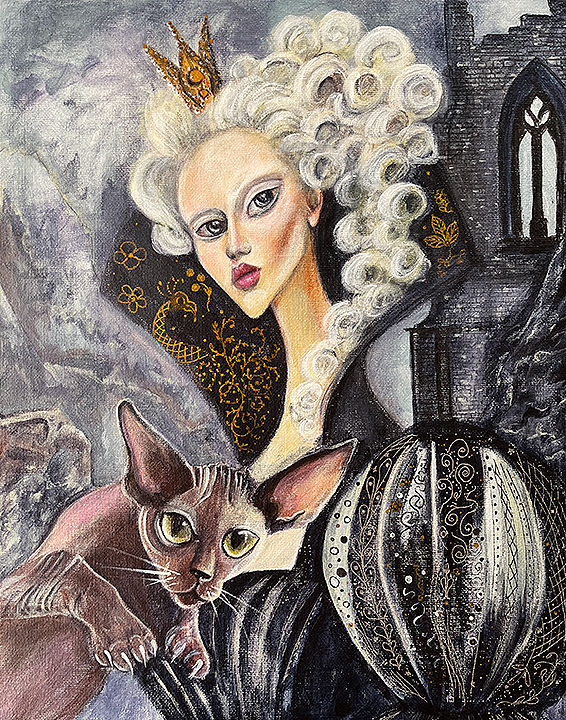Vivienne of the Velvet Skull and Hexel
- Natalia Lakes

- Aug 8
- 4 min read

Long ago—before she wore a crown and ruled the Clockless Tower Kingdom—she was only a girl. A clever, pretty thing with daisies in her hair, who asked too many questions and read too many books. She lived by a river where the current braided itself around smooth stones.
One afternoon she followed a Sphynx cat into the woods—furless, affronted, ears like unfurled sails. He led her to the stone skeleton of a chapel that rose from the mountain like a broken fang. The windows were tall and arched. The saints inside had been blurred by time into pale ghosts.
Beneath the stained glass windows, she met Him.
His voice was low and golden—dusk spilling through cathedral arches—and his eyes held a quiet fire. He read her poems. He brought her roses and rubies. He made her laugh.
So she let him into her wondering heart, and soon their days gleamed with the soft opulence of a private dream: dinners under chandeliers in secret courtyards, champagne midnights, silk-lined hours. He bought her rare books and velvet gowns; she gave him all her love. The life was stitched in gold thread—beautiful, fragile, too perfect to last.
As you may have guessed—this is not a happy story.
On the night he left her for another woman, grief came like a dark tide. She wept until her lungs burned and her ribs trembled. Grief was brutal and unrelenting. Her heart pulsed with a hollow agony. Her hands kept reaching toward the spaces he used to fill—as if her body hadn’t yet caught up to the fact that he was gone. She would have done anything—anything—to step out of the pain.
It was then—without warning or sound—that a stranger arrived.
He wore a black cloak, a hood shadowing most of his face. In one hand he held a lantern, dim and flickering like a dying star; in the other, a large parcel wrapped in heavy velvet. The light touched the walls, her face, the floorboards—but cast no shadow of him.
She stared, too stunned to speak.
“Are you ready?” he asked. “I can release you. Some women are not meant to love—only to rule. I can give you a kingdom, and beauty that will never age.”
He unwrapped the parcel. Inside was a painting: a Sphynx cat, ears vast, eyes too human, licking a paw with theatrical boredom.
“Some cats are born of witches,” the stranger said. “This one is Hexel. He knows how to make you feel better.”
The painted surface shimmered like water about to drown something. She watched herself open her eyes inside the picture. That version of her was resplendent and grotesque—skin pale as bleached parchment, hair heaped like coils of pearls, gown stitched with gold. Behind her rose a tower without a clock-face, a kingdom with no measurement for regret.
Step into the painting,” said the stranger.
She signed the book he offered—paper pressed from feathers. The ink was white. The price—her future. Then she stepped through.
The court she entered shone with the chilled loveliness of a crystal pavilion. Velvet as dark as spilled wine. Gold embroidery catching candlelight like frost. Serpentine candelabra hissing their shadows along the stone. Feasts eaten in silence; the glint of a knife saying more than any tongue. At midnight, windows in the storm-wracked tower shattered without wind. People called her Vivienne of the Velvet Skull (not to her face). To her face, they bowed. It was known she loved no one—save the cat who alone held the dangerous privilege of her heart.
Hexel the Sphynx was everywhere the Queen wasn’t looking—and always where she had just been. He had a talent for chaos. At tea he toppled honey pots. During formal dinners he slunk under the table and vandalized ambassadors’ shoes.
Once, during a waltz, Hexel leaped out of the Queen’s portrait as the violins crested that exquisite aching high note. Ladies screamed. The harpsichord combusted. Vivienne only laughed and scooped him up.
“Don’t be ridiculous,” she said. “That’s Hexel. He’s my soul’s little bruise.”
Her ladies-in-waiting—powdered beauties who looked like extras from a silent film about vampires—nodded gravely and applied more powder. They understood such things. And each time Hexel misbehaved, the Queen grew more luminous.
“I can’t help it,” she confessed once, idly tracing her cheekbone with a fingernail painted the color of dried blood. “He rocks my world.”
There was the evening Hexel rewired the chandelier so it would fall exactly during a toast. No one left that dinner. Some claimed the guests were trapped in mirrors, forever sipping from crystal goblets. Others swore they had been changed into beasts, haunting the catacombs in elaborate gowns.
In the Clockless Tower Kingdom, time does not pass; it pools in still, silver basins. Regret can not accumulate where there is no hours to contain it. Vivienne does not age. The Stranger keeps her future rolled tight in his coat pocket.


